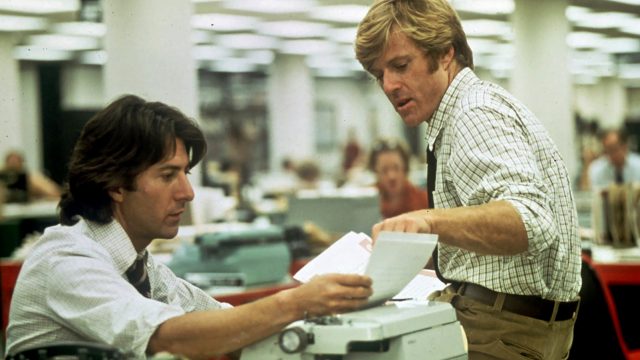Combining the freedom of the press with democracy created unprecedented power for the printed word that only grew with literacy rates and printing technology. Last time we convened, newspaper writers enjoyed the power to persuade the public. In today’s films we observe the newspaper as an institution capable of challenging even the traditional seats of power. Careers had risen and fallen at a word from the press but the Washington Post of the 1970s set a new standard, defying and destroying an acting ruler of the world. Newspapers held such influence on the political world for so long it was unimaginable that they could be replaced or ignored. But time crumbles all empires, and the recent fragility of that status can be seen in the treatment of the written word in All the President’s Men (1976) and The Post (2017). Both films cover the same paper during the same presidential administration from opposite sides of the digital revolution.
The opening shot of All the President’s Men impresses the weight of the printed word as typewriter teeth bang out the present date with the force of gunshots. The movie adapts Washington Post reporters Bob Woodward and Carl Bernstein’s memoir about that one time they connected a bungled burglary to a larger conspiracy of domestic espionage that eventually begat the resignation of President Richard Nixon. Instruments strike paper often in All the President’s Men. Woodward (Robert Redford) and Bernstein (Dustin Hoffman) scour records and pursue and pester leads for months. They contend with deadlines and uncooperative informants with their next step in mind, but the finish line keeps moving. Aside from a few more violently typewritten headlines, the movie ends with Woodward and Bernstein heads down at their desks, forever updating the official record.
“I’m not interested in what you think is obvious,” Ben Bradlee (Jason Robards) tells them, “I’m interested in what you know.” Woodward and Bernstein locate the written facts – library records, accounting books, lists of names – and rediscover the facts behind the records that have been destroyed and write them down again. Facts are not real unless they are written down.
The Post is a prequel in everything but name to All the President’s Men, including a coda that delivers us shots of the Watergate break-in that match the opening scene of the earlier film. The film also dabbles in tracking information and games of confirm or deny with sources. Yet the film is a product of the new journalism landscape of the 2010s.
Instead of reporters, the film tells a story of managers, namely WaPo owner Katherine Graham (played effortlessly by Meryl Streep) and expanded screentime for editor Ben Bradlee (played with effort by Tom Hanks). Where Woodward and Bernstein were collecting and assembling scattered bits of paper, the sacred texts of The Post are already centralized in the form of the Pentagon Papers, a stolen classified defense report that revealed the full scope of secret actions by the US government during the increasingly untenable Vietnam War. Being already contained in several cardboard boxes, the Pentagon Papers become a stand-in for Information and the currency that comes with it.
It’s tempting to attach this last aspect to Spielberg, he who traffics in meaningful totems like arks and lists. But it’s entirely appropriate to the agenda of The Post, produced in an era of hostility between the White House and the press where, unlike Nixon, the sitting president has alternative routes to disseminate information to trusting members of the public. What do written facts mean in a world where the truth and most things beyond it are recorded, never destroyed, and distributed instantly to the population? In entering an argument about the right and the necessity of a paper as the presenter of Information, the film reduces the printed word itself to a MacGuffin.
In The Post the “written” aspect is inconsequential – the newspaper is an institution compelled to aggregate and disseminate information. In All the President’s Men information is useless without the writing to propel it. The Post pauses for a few historical appreciations of journalism, “the first draft of history,” with the mission to “serve the governed, not the governors.” Woodward and Bernstein argue about their duty to provide proof, but it’s as they drive the dark streets on the hunt for the next scrap. The Post climaxes with Bradlee ordering the presses to run. All the President’s Men has no recognizable climax, only Bradlee ordering a weary Woodward and Bernstein to “rest up fifteen minutes. Then get your asses back in gear.”
It’s no wonder then that the older film is denser and more rewarding even as it eschews conventional structure while the newer movie is impeccably crafted yet ultimately less satisfying. News gathering as gumshoe work is more pleasing than confirming newpapers as rightful beacons of freedom. Bradlee, in both eras, knows it’s true. In The Post he declares in the midst of the chase to find the Pentagon Papers to declare “My God, the fun!” The most celebration he has time for in All the President’s Men, as his reporters hit a new checkpoint in the ongoing story, is a single clap and a low fist pump.

